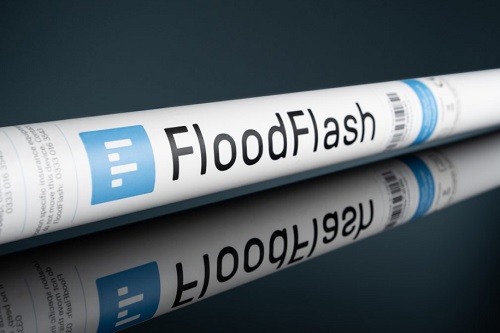The FloodFlash annual magazine: the future of the smart sensor

Authored by FloodFlash
In the final article of our annual magazine, we spoke to two people who are closer to the sensor than any others: Head of Hardware Pete Codling, and Operations lead Tom Rogers. We sat down with the sensor team to do some future-gazing and answer the question: what’s next for the FloodFlash sensor. Read on to find out some of the key themes that came out of our conversation.
Getting clients hands on the sensor
Both experts suggested that in the years to come, FloodFlash might allow clients to gain more control and get to unpack the sensor and get a feel for the tech behind the policy.
The other way to get sensors into the hands of customers would be with a free trial or data-only sensors. Customers could explore how the sensor fits with their resilience and benefit from millimetre accurate depth measurements.
Dressed to impress
Some of the more fun ideas from the sensor experts involved the form of the sensor. Customisable colours, smaller sensors and even sensors with historical flood depth marks all formed ideas that could see the sensor getting a makeover in the future.
Our smart sensor could have historical depth marks showing previous flooding at the property, much like how river gauges show historical water depths.
Making the data go further
Our rapid payout claims start with the sensor data that arrives in the time it takes to send a text. For Pete and Tom, that data could be used in many other ways. The sensor could provide live updates of flood depth at a property, or warn customers when nearby sensors detect flooding.
Our sensor experts spoke of the benefits that FloodFlash sensor data could bring to the wider flood resilience community. For example:
Flood experts using sensor data to map the impact of flooding on properties.Flood resilience companies using the sensor technology to help develop future flood resilience product.Research organisations, governments, and construction companies incorporating sensor data into their project plans.
We’re already thinking about the future of the sensor and these ideas are just the tip of the iceberg. If you have ideas however functional or fun, get in touch with enquiries@floodflash.co and you could influence the future of flood sensor technology.
Want to get involved?
Flooding remains a significant issue for people and properties across Britain and around the world. The global flood protection gap currently stands at 80%. Man-made climate change, urbanisation and population growth will only make this number higher.
Individuals are more and more willing to use technology in insurance. The insurance industry is starting to adapt to new risks, and use new technology to better support clients. FloodFlash can help provide flood cover to the most at-risk businesses using parametric principles and IoT technology.
If you want to get involved with our annual campaign, get in touch. We can provide FloodFlash materials in your branding to share internally and with your clients. Follow us on LinkedIn for the latest from the magazine. You can also sign up to our newsletter to hear more about FloodFlash every month.





